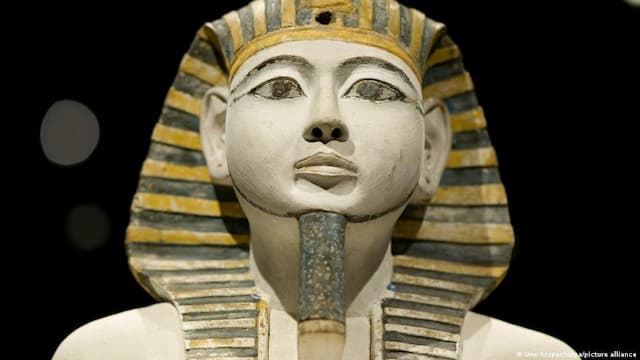Jacob’s life in God’s house (Genesis 35)
Jacob is invited to live in God’s house (Bethel). How well do they do?
Bethel—literally God’s House—is where Jacob is invited to live. But if they are to live in the house of their heavenly sovereign, they must purify themselves. After the skirmish with the Shechemites, the smell of death is on them and their clothes. Among the spoils are idols and talismans. When these impediments are gone, they enter Bethel. The surrounding cities are too terrified to seek vengeance on these servants of the heavenly king (35:1-5).
When he reaches Bethel, Jacob constructs an altar to celebrate the monarch who lives here, literally The God of God’s House (El-Bethel in verse 6). The one who rules the whole earth is fulfilling his promises through Jacob. Just as he promised (28:15), he has been with Jacob, answering him in his distress (35:3).
As Jacob acknowledges his sovereign’s faithfulness in the past, the divine king reveals the kingdom hope of the future. God Shaddai—the revealed name of the patriarchal covenant—is fulfilling his commitment to Abraham and to the nations. The one whose presence has already transformed Jacob into Israel (35:10) will complete his kingdom agenda in the generations ahead: descendants, nation, kings, and land:
Genesis 35:11–12 (ESV)
11 God said to him, “I am God Almighty: be fruitful and multiply. A nation and a company of nations shall come from you, and kings shall come from your own body. 12 The land that I gave to Abraham and Isaac I will give to you, and I will give the land to your offspring after you.”
When Jacob first received the revelation of the portal to God’s house, he marked the holy site with an anointed stone (28:18). He responds the same way to this second Bethel revelation (35:14). God’s faithfulness in the past gives the certainty for Jacob’s faith for this future.
God’s future awaits him, but it’s still a struggle. He loses Deborah, his connection to the mother he never saw again (35:8). He loses his father (35:29). He loses the love of his life, Rachel, as she gives birth to his twelfth son (35:19).
If that isn’t enough grief, his oldest son Reuben takes Rachel’s maid Bilhah and sleeps with her. The motivation is not primarily lust: it’s a power-grab. It’s a statement that Reuben considers his passive father too impotent to run the family and that he, Reuben, the oldest son, is now in charge (compare 2 Samuel 3:6-7; 16:21–22).
Reuben’s vile actions deserve the death penalty (Leviticus 20:11) and divine curse (Deuteronomy 27:20). The real threat to the kingdom-of-God project comes not from the foreigners who respond to God with terror (35:5), but from within—from people like Reuben who display no fear of the heavenly sovereign. How can he behave like this after the divine revelation at Bethel?
Apparently Jacob is powerless to do anything about it. He hears, but takes no action (35:22). Reuben saw his father disapproving of Simeon and Levi but taking no action against them either (34:30). Now Jacob has been publicly shamed by all three of his eldest sons: Reuben, Simeon, and Levi.
On his deathbed, Jacob passes over all three of them. The double-blessing goes to Joseph instead of Reuben (Genesis 48 – 49). Reuben’s power-grab failed.
The greatest threat to God’s kingdom project is not rape by outsiders. It’s corruption of the family from within.

What others are saying
Gordon J. Wenham, Genesis 16–50, Word Biblical Commentary (Dallas: Word, 1998), 327:
It seems likely that Reuben’s motives were more than sensual. By his act, he hoped to prevent Rachel’s maid succeeding Rachel as his father’s favorite wife. Reuben resented that Jacob did not honor his mother Leah. Also, it was a claim to authority over his father (cf. Abner lying with Saul’s concubine, 2 Sam 3:7–8); as firstborn he was asserting a claim to his father’s estate. But these motives do not mitigate Scripture’s condemnation. This kind of incest is categorically condemned in Lev 18:8, and according to Lev 20:11, it warrants the death penalty and God’s curse, according to Deut 27:20. Within Genesis, it evokes the sins of Ham (9:22–27) and Lot’s daughters (19:33–38), and outside Genesis it foreshadows the ultimate act of hybris in Absalom’s rebellion, when he went into his father’s concubines (2 Sam 16:21–22). This act was a turning point in the rebellion; thereafter everything started to go wrong for Absalom. Similarly, the legal texts show that such an act, which is an offense against both filial piety and sexual propriety, cannot go unpunished. Yet here, as in chap. 34, Jacob is strangely silent. He just “heard about it” (cf. 34:5).
Nahum M. Sarna, Genesis, JPS Torah Commentary (Philadelphia: Jewish Publication Society, 1989), 239:
The theme of sexual offense is shared by both chapters, and in both cases Jacob maintains his silence, which is expressed by means of the Hebrew verb sh-m-ʿ, “to hear.” In both instances, as is clear from 49:3–7, sons of Jacob forfeit their place in the line of leadership succession. Chapter 34 is dominated by the theme of defilement; this chapter opens with the subject of purification. Finally, both narratives exhibit a consciousness of Israelite distinctiveness. This is expressed through sexual purity and the rite of circumcision in the preceding story and through the renunciation of idolatry in the present one.
Read Genesis 35.
[previous: Were Simeon and Levi justified?]
[next: Esau’s ordinary kingdom]
Seeking to understand Jesus in the terms he chose to describe himself: son of man (his identity), and kingdom of God (his mission). Riverview College Dean
View all posts by Allen Browne











